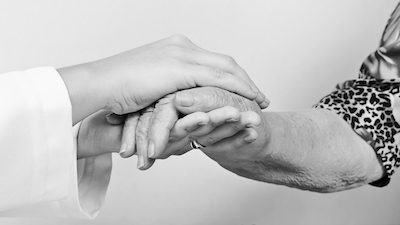The Healing Power of Touch. Why are we Depriving our Elders?

 It the first sense to develop in the womb and one of the last ones to go during the dying process.
It the first sense to develop in the womb and one of the last ones to go during the dying process.
It is one of our most fundamental human needs. It remains for a lifetime.
As we experience decline of the body or mind due to aging or illness, the need for human touch may be accentuated in the search for reassurance, comfort, and connection.
Is Touch Deprivation Real?
Touch deprivation in old age is very real, especially for the medically frail elder, persons living with dementia, and older adults living alone. Despite their need for touch and being especially receptive to touch, they are often the least likely to receive healing or expressive touch from health care providers or family members. Studies have confirmed that nursing students have been shown to experience anxiety about touching older adults. This anxiety, along with demands on staff time and duties, lack of training on distinguishing the differences between effective and ineffective touch, and simply society's fear of touching ill and frail elders has led to wide-spread touch deprivation in our aging adult population.
Touch deprivation leads to feelings of isolation, anxiety, poor trust in caregivers, insecurity and decreased sensory awareness. These kinds of distress can lead to behavioral responses or expression.
"It is well known in professional circles that young nursing students tend to avoid touching elderly patients, and especially the acutely ill...touching as a therapeutic event is not as simple as a mechanical procedure or a drug, because it is, above all, an act of communication....the use of touch and physical closeness may be the most important way to communicate to acutely ill (and aged) persons that they are important as human beings."
-Ashley Montagu, Touching: The Human Significance of the Skin
Physiological Effects of Touch
Healing, compassionate touch tilts a person's response away from stress towards well-being.
Touch stimulates the production of oxytocin, a chemical in our brain that leads to feelings of closeness and security. When oxytocin is released, feelings of safety, caring, trust and decreased anxiety take place in a person's body. Oxytocin has often been referred to as the "care and connection" hormone. Simply put, when your brain releases oxytocin, you feel good!
At the same that oxytocin is released, another chemical is decreasing when we experience healing touch. Cortisol is a hormone that increases when we are stressed. Studies show that cortisol levels decrease after even five minutes of skilled touch. Apart from the physical relaxation, skilled touch increases our emotional well being.
Is the Tide Changing?
"The most important innovation in medicine to come in the next 10 years: the power of the human hand." - Dr. Abraham Verghase
We are witnessing transformational shifts in dementia care across the globe. No longer is status quo acceptable, as we now understand the importance of person-centered care, the meaning of life enrichment and our responsibility to create moments of joy and purposefulness.
We have the opportunity to get back to the basics of human needs with effective, feasible and transformative tools that are literally in our hands.
Pam Brandon is President/Founder of AGE-u-cate® Training Institute and worked with leading Touch expert, Ann Catlin, ORT, LMT in the development of Compassionate Touch® program for eldercare providers, hospitals, practitioners and families. Pam is a passionate advocate for creating positive change in aging care. Pam may be reached at pam@AGEucate.com
To learn more about the Compassionate Touch program visit www.AGEucate.com

.jpg)
